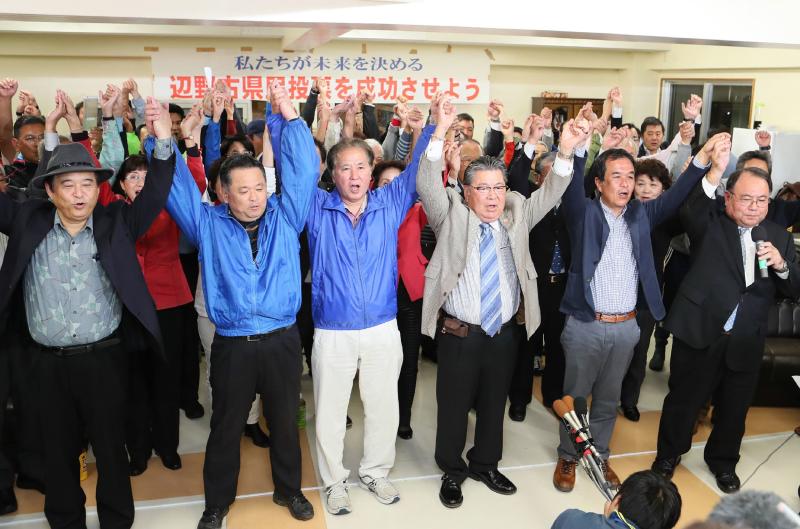Okinawa overwhelmingly votes 'no' to US base relocation
Sign up now: Get insights on Asia's fast-moving developments

The people of Okinawa react following the results of a referendum on the relocation of a US military base in Naha, Okinawa Prefecture, on Feb 24, 2019.
PHOTO: AFP
TOKYO - Okinawa residents resoundingly voted against the relocation of a key American air base on Sunday (Feb 24), in a result that is bound to inflame tensions between the prefectural and national governments.
Some 72.8 per cent of voters said no to moving the United States Marine Corps Air Station Futenma from densely populated Ginowan to the coastal Henoko district, with 96 per cent of the ballots counted last night.
The national government wants the base moved because of national security and safety concerns but what Okinawans really want is to move the base off their island.
Turnout was 52.48 per cent of the more than 1.15 million people aged 18 and above who were eligible to vote.
The vote is merely symbolic, as it is not legally binding on the central government and Prime Minister Shinzo Abe has said Tokyo would ignore the outcome. Washington also backs the move.
The central government has already drawn flak for being "undemocratic" were it really to ignore an overwhelming result. This could reverberate in elections this year.
Mr Fumio Kishida, policy chief of the ruling Liberal Democratic Party (LDP), said the party was committed to protecting people's lives and defending Japan's territory. This means, he added, avoiding the use of Futenma while finding ways to reduce the burden on Okinawa.
Okinawa Governor Denny Tamaki, who was elected by an enormous margin last year on an anti-base platform, will travel to Tokyo this week for talks with the Cabinet and the US Embassy, the Asahi Shimbun reported.
Voters had three options: yes, no, or neither. The last option was added after five of Okinawa's 41 municipalities that are led by the LDP said they would boycott the referendum in the event of a binary choice.
By a prefectural ordinance, Mr Tamaki has to "respect" the outcome if over one quarter of the eligible electorate, or about 288,000 people in this case, votes for a single outcome. With the threshold achieved, Mr Tamaki will need to notify Mr Abe and US President Donald Trump of the result.
Okinawa has long been upset by what it sees as a disproportionate military burden, a legacy of nearly 30 years of US administration following World War II.
The prefecture accounts for just 0.6 per cent of Japan's total land area, but hosts about 70 per cent of the total US base area and more than half of the 47,000 US personnel stationed in Japan.
Futenma, which has been billed as the "most dangerous base in the world", as it is located in a residential area, has drawn noise and safety complaints. In a 2017 incident, a window from a US chopper fell onto the grounds of an Okinawa elementary school.
A spate of high-profile crimes committed by US base workers has exacerbated the situation, including drink-driving, rape and murder.
The trigger for the relocation was the 1995 gang rape and abduction of a 12-year-old schoolgirl by three US servicemen, which led thousands to protest.
A prefectural referendum a year later, on scaling back US bases and reviewing a key agreement on the deployment of US troops, saw nearly 90 per cent voting in favour.
Yet the Henoko site, too, is controversial, given the need for extensive land reclamation. Critics say this will not only ruin its pristine beaches, but also damage a delicate marine ecosystem home to the endangered dugong and coral reefs.
The Henoko relocation plan has been on the table since April 1996, and in its stalling tactics, Okinawa wants to force Tokyo's hand to agree to move the base out of the prefecture altogether.
But the central government maintains that the current plan is the "only solution" to reduce the dangers attributed to the Futenma base, given Okinawa's strategic importance from its proximity to both the East and South China Seas, as well as Taiwan.
The prefecture, too, administers the Senkaku/Diaoyu islets claimed by China, which has made encroachments into Japanese waters.
Okinawa-born Jinshiro Motoyama, 27, took a gap year from his graduate studies in sociology at Hitotsubashi University in Tokyo to lead a civic movement against the relocation.
He told Kyodo News last night: "This is a major development for the democracy of Okinawa. I want the government to act according to the popular will."


